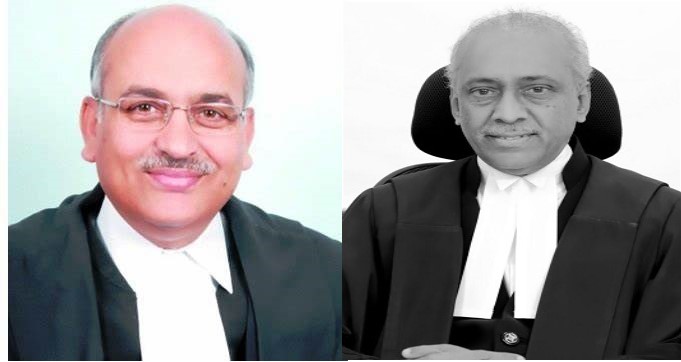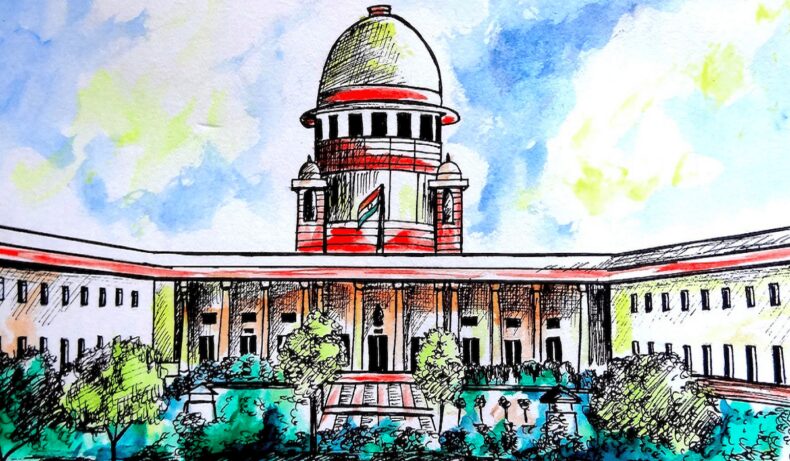While setting aside a decision of the Division Bench of the High Court, the Supreme Court upheld the dismissal of the Civil Judge stating that it is the duty of the judge to dictate or prepare the entire judgement and merely pronouncing the result is not enough.
Table of Contents
Background
The respondent in this case was a Civil Judge of batch 1995. On certain allegations of some gross misconduct the respondent was suspended from his service in 2005 and enquiries to investigate the allegations started.
Four separate charge memos were made and for each memo a separate enquiry report was filed.
When the allegations were proved, a Full Court of the High Court of Karnataka following a second show cause notice, ordered the dismissal of the respondent from his service as a penalty for default.
The respondent challenged the orders of the enquiry officers and his dismissal vide four separate writ petitions in the High Court which were dismissed.
Aggrieved by the dismissal the respondent filed intra-court appeals which were allowed by the Division Bench of the High Court, which not only set aside the dismissal order but also discarded the enquiry reports and on top of it also held that no further proceedings shall be taken regarding the dismissal of the respondent.

Hence, the Registrar General has filed an SLP before the Supreme Court against the abrupt setting aside of the penalty of dismissal by the Division Bench of the High Court.
Perusal of facts by the Supreme Court
The Supreme Court examined all the four charge memos, the reasoning given by the respondent for each charge framed against him and the proof of evidence given by the enquiry officer in his report.
- Denied to go into merits
The Supreme Court upon examining the charge memos found that some of the orders passed by the civil judge were judicial orders and as per the convention the court decided to ignore those decisions.
- Mere concluding part
However, the Supreme Court found that there were some serious charges and offences, still the Civil Judge did not prepare or dictate the entire judgment to the stenographer and mere pronounced the concluding portion in the open court. The Court found this action to be a gross misconduct on the part of the Judge. The Supreme Court also held that blaming the Stenographer who was also a novice at that time will not be enough to escape the charges.
- Full Court of the High Court
Regarding the challenges that were raised by the respondent against the penalty of dismissal ordered by the Full Court of the High Court, the Apex Court held that at the stage of SLP, it can only test the reasonableness of order of the High Court’s Full Bench and that the inquiry officer conducted his duty properly and not perversely.
Also Read: Supreme Court warns Defence Ministry of ‘contempt’
- Opinion by the Division Bench
The Supreme Court was amused by the opinion of the Division Bench wherein it has attributed that the acts of the respondent did not constitute grave misconduct; the dismissal from is innocent and honest and that no further proceedings shall be held. Upon this opinion the Apex Court has observed that it adds ‘fuel to the fire’ and is a veiled attack on the Full Court of the High Court.
- Second Show Cause Notice
The respondent had alleged that when a second show cause notice was issued it already included order of dismissal; however, the proceedings before the Full Court were not concluded. The Supreme Court found out that the second show cause notice did not contain anything related to dismissal of service and the dismal order was made months after the notice was issued.
Verdict of the Supreme Court
The Supreme Court bench presided by Justice V. Ramasubramaniam and Justice Pankaj Mithal, while expressing concern against the impugned order of the Division Bench wherein while setting aside the penalty it had ordered not to engage any further inquiry against the delinquent, set aside the Division Bench Order, allowed the appeals and upheld dismissal from service of the respondent while imposing costs.
Case Title: The Registrar General, High Court of Karnataka & Anr. v. Sri M. Narasimha Prasad (2024 SC)













